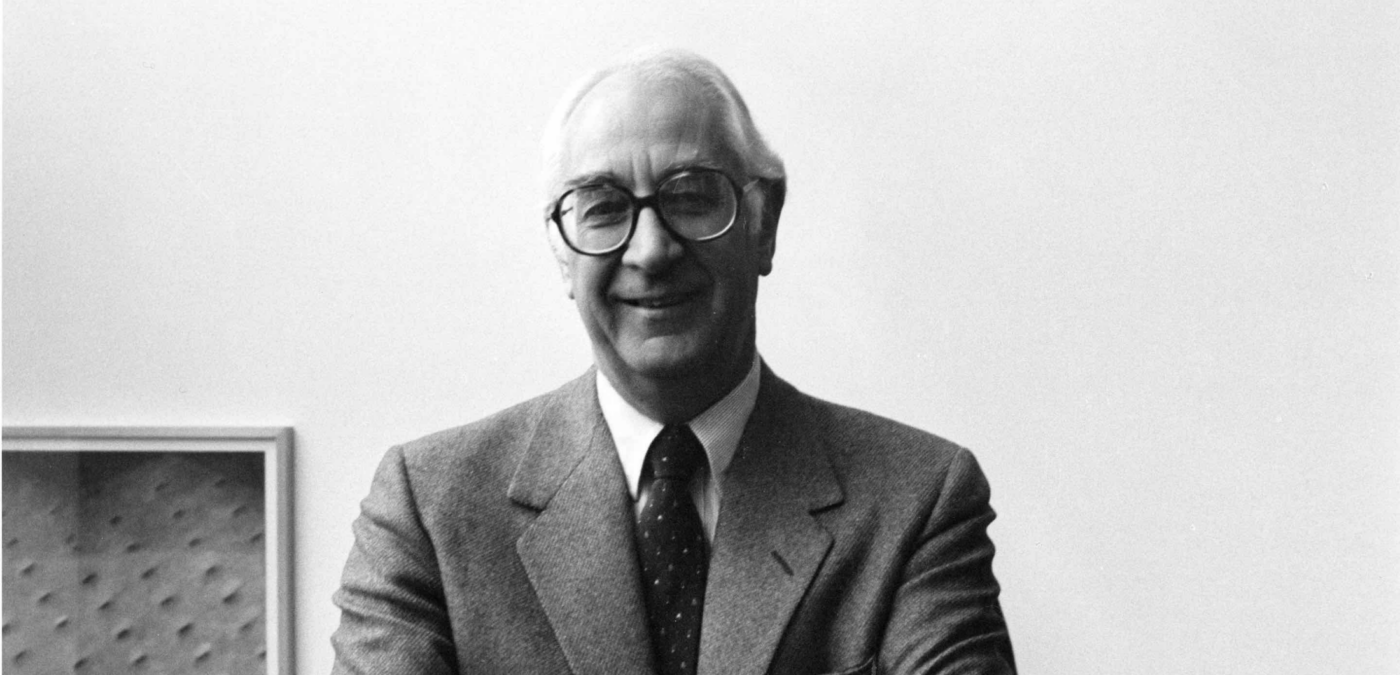Our History
Equipping leaders for faithful service since 1996

Our namesake
Max De Pree was the long-time CEO of Herman Miller, Inc., a Michigan-based company that revolutionized office workspaces in the mid-twentieth century with its “modern” designs. During his tenure, Herman Miller became one of the most profitable Fortune 500 companies. From 1975 to 1986, it ranked seventh in terms of total return to investors.
What is perhaps less known about Max De Pree is the degree to which he was intentional about allowing his beliefs to shape his approach to life, management, and leadership. People who knew him well describe how he was the same person in the boardroom, at church, and at home with his family.
Former Fuller President David Allan Hubbard and Max De Pree were best friends. Hubbard invited De Pree to join the Fuller Board of Trustees. De Pree served faithfully on the board from 1964 to 2005.
OUR HISTORY
The Max De Pree Center for Leadership was founded in 1996 by Samuel T. Reeves in honor of his good friend and fellow Fuller Seminary board member Max De Pree. Sam established the center in recognition of the profound influence Max had on leaders throughout the world–not only through his leadership of Herman Miller Inc. but also through his bestselling books, non-profit work, and mentoring. Initially, the center was designed to be a platform through which David Allan Hubbard could be a resource for leaders following the end of his presidency.
Early Days
Fuller professor Dr. Robert Banks, who was at the time a leading thinker on the role of faith in the marketplace, was the first Executive Director of the De Pree Center. Dr. Bernice Ledbetter led alongside him. Together they co-authored Reviewing Leadership: A Christian Evaluation of Current Approaches.
Dr. Walter C. Wright, Jr., former president of Regent College, became the Executive Director in 2000. In the early 1980s, Wright was a young administrator at Fuller when the seminary brought De Pree to speak at the school. Shortly thereafter, Wright became one of De Pree’s longtime mentees. Wright sought to learn De Pree’s leadership philosophy so that he could both apply and teach it. Wright distilled what he learned in his book Relational Leadership: A Biblical Model for Influence and Service. Under Wright’s leadership, the De Pree Center focused on further developing De Pree’s concept of relational leadership and exploring how beliefs shape the practice of both individuals and organizations.
We can often associate reflection with criticism, assuming it serves only to show us our weak spots or how we need to improve.
– Dr. Walter C. Wright, Jr.
Wright also launched the De Pree Fellows program, an initiative designed to equip Fuller graduate students from a variety of disciplines to study the integration of their work and leadership. Current executive director Michaela O’Donnell was a fellow during Wright’s tenure.
Dr. Gideon Strauss assumed leadership of the center in 2012. Under his direction, the De Pree Center adopted the following mission:
The Max De Pree Center for Leadership is a catalyst for the truly human practice of work, leadership, and organizational life in businesses, non-profits, and churches by generating and curating world-class, theologically informed academic research and education, providing life-changing leadership insights and stories through leading-edge media, and convening innovative gatherings to equip and network leaders.
A New Focus, A New Era
In 2015, Dr. Mark D. Roberts became the executive director. Roberts, with years of pastoral and non-profit leadership experience, brought a unique perspective and vision to the center. His long-term commitment to and engagement with marketplace and other leaders helped the center focus on serving leaders so that they might flourish in all seasons of their life and leadership. Roberts started and remains the primary author of the De Pree Center’s Life for Leaders devotional which reaches thousands of readers around the globe each workday.During his time as executive director, Roberts worked closely with Dr. Michaela O’Donnell, then Senior Director of the De Pree Center, Dr. Scott Cormode, Hugh De Pree Associate Professor of Leadership Development, and Dr. Tod Bolsinger, Executive Director of the Church Leadership Institute.
Growing Center, Growing Impact
Out of his belief in developing the next generation of leaders and his desire to focus on specific projects for the De Pree Center, Roberts stepped down from his role in 2021 in order to promote Senior Director, Dr. Michaela O’Donnell, to Executive Director. O’Donnell came to the role with years of experience leading Long Winter Media, a creative agency. She was also the primary visionary and creator of the De Pree Center’s Road Ahead program, which draws heavily on her dissertation research on entrepreneurship. O’Donnell is also the author of Make Work Matter: Your Guide to Meaningful Work in a Changing World and co-author of the forthcoming Life in Flux (Baker Books, 2024).
The Dale and Mary Andringa Executive Director Chair
In 2022, Dale and Mary Andriga made a gift of $2.25 million to Fuller to create and endow the Dale and Mary Andringa Executive Director Chair of the Max De Pree Center for Leadership. Mary Andringa is chair emeritus of Iowa-based Vemeer Corproation as well as a member of Fuller’s Board of Trustees.
Both Dale and Mary knew Max De Pree and had the opportunity to be mentored by him. Mary shared,
We learned a lot from Max about stewardship and the integration of faith and work. We know that the resources provided by the De Pree Center can really support business leaders who are striving to integrate their own faith and work.
In a special ceremony, Fuller President Mark Labberton installed Mark Roberts as the inaugural chair as a way to honor him for his years of faithful service to the De Pree Center. Michaela O’Donnell formally assumed the chair in May 2022.

Dr. Michaela O’Donnell Long sits in an Eames Highback Chair (the same one Max De Pree used as CEO of Herman Miller), a symbolic gift from the Andringas to commemorate the new position.
MAX DE PREE: BELIEFS SHAPE PRACTICE
Every generation has its distinguished leaders who shape their fields of expertise. Max De Pree is one such leader. He is perhaps best known for his work as the CEO of Herman Miller, Inc.
Marketplace Success with Herman Miller
Herman Miller was founded by Max’s father D. J. De Pree, who ran the company until the early 1960’s, when Max and his brother Hugh assumed responsibility for its leadership. During his tenure, Herman Miller became one of the most profitable Fortune 500 companies. From 1975 – 1986 it ranked seventh in terms of total return to investors.
Max’s greatest legacy, and the impact he was proudest of, was his way of incorporating his beliefs into the organizational culture. Under De Pree’s leadership, Herman Miller instituted the Scanlon Plan, a program that encouraged and rewarded employee participation with stock in the company. Moves like this displayed his thoughts about how mentoring is like a carabiner: the mentor provides a safety rope, not taut but always present. As the individuals are lifted, the organization is lifted. With a foundation built on trust and integrity, the company went on to work with some of the design world’s greats, and earned the respect and admiration of such design icons as Ray and Charles Eames and George Nelson. Perhaps the intentional culture helps explain how a company based in Zeeland, Michigan was able to establish itself as an innovative design firm synonymous with an era of modern, design-first furniture. De Pree’s body of work earned him a place in Fortune magazine’s National Business Hall of Fame.
An intentional man, in public and private
What is perhaps less known about Max De Pree is the degree to which he was intentional about allowing his beliefs to shape his approach to life, management, and leadership. His books Leadership Is an Art, Leadership Jazz, Leading without Power, Called to Serve, and Dear Zoe demonstrate this. His understanding of leadership as art and jazz said much about his own aesthetic. Readily forthcoming about his commitment to Christianity, it is Max’s theology, more than anything else, that shaped who he was and the way he lived. He did not separate his private and public selves. Rather, he was the same man in board meetings, consulting, or speaking that he was one-on-one. A highly respected business leader, he was also a beloved father, husband, and grandfather. Max was a student of human nature and of life. His integrated vision of what it means to be human in the fullest sense is perhaps the result of his own pursuit of life.
LOOKING FORWARD
O’Donnell leads a dynamic, entrepreneurial team. Under her leadership, the De Pree Center is growing in reach, programmatic development, and team capacity. The center has entered into a new era of conducting original research in order to better understand and respond to the needs of today’s leaders.
Now, the De Pree Center is poised to leverage the resources of the seminary and integrate this original research with theological reflection in order to help leaders do their inner work in a distinctively Christian way so that they can impact their organizations and the people they serve in an increasingly volatile world.


